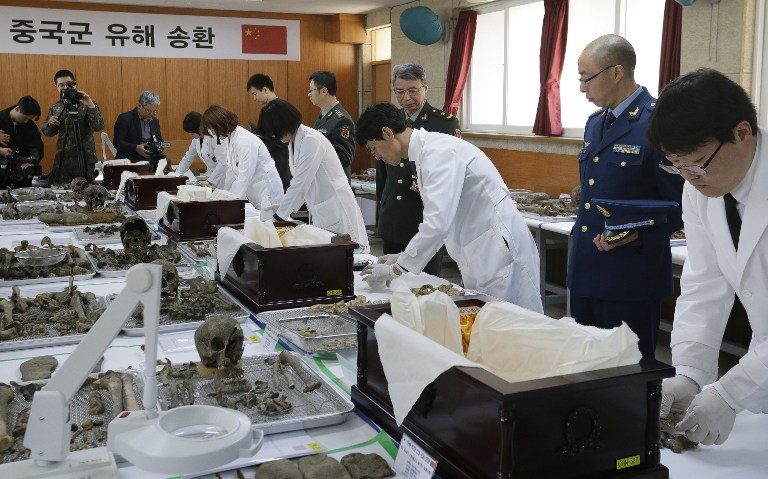SUMMARY
This is AI generated summarization, which may have errors. For context, always refer to the full article.

SEOUL, South Korea – South Korea on Thursday, March 31, sent the remains of dozens of Chinese soldiers killed during 1950-53 Korean War back to China for a final burial in their homeland.
Coffins carrying the remains of 36 soldiers – excavated by South Korea’s Defense Ministry from March to November last year – were flown from Incheon airport to the northeastern city of Shenyang, where China has a state cemetery for its war dead.
In a separate ceremony on Monday, March 28, the remains, including bone fragments and skulls, had been placed in the coffins at a temporary mortuary in Paju, near the border with North Korea.
In 2013, South Korean President Park Geun-Hye had offered to return the bodies of the Chinese war dead as a goodwill gesture during a visit to Beijing.
Since then, Seoul has repatriated a total of 505 sets of remains, flying them back every year ahead of the annual Chinese Qingming, or tomb-sweeping, festival when many people visit and clean the graves of their ancestors.
This year’s festival falls on April 4.
China fought alongside North Korea in the 1950-53 conflict – its dramatic and crucial intervention coming after US-led forces had pushed the North Korean army into the far north of the peninsula.
Casualty figures remain disputed but Western estimates commonly cite a figure of 400,000 Chinese deaths, while Chinese sources mention a toll of about 180,000.
The bodies were initially buried in small plots scattered around the country.
In 1996, Seoul designated a special cemetery plot in Paju, just south of the heavily fortified border with North Korea, where all the remains of Chinese and North Korean soldiers still on South Korean soil could be buried together.
More than 700 North Korean soldiers are interred at Paju, but Pyongyang has ignored Seoul’s offer to return them despite sporadic talks on the issue.
The site also holds the bodies of more than two dozen North Korean commandos killed in a daring but unsuccessful 1968 attack on the presidential palace in Seoul.
A North Korean agent responsible for the 1987 bombing of a South Korean airliner that killed 115 people, who committed suicide after he was captured, is also there. – Rappler.com
Add a comment
How does this make you feel?
There are no comments yet. Add your comment to start the conversation.